Bjørn Jacobsen has provided sound design for some huge video game titles such as EVE Online, the recent Hitman reboot and the much-anticipated Cyberpunk 2077. Such incredible credits didn't come easily to Bjørn, whose career only really started 10 years ago. Ahead of his guest lecture at dBs Music Bristol we spoke with him about those early days growing up with music, his blossoming interest in sound design and the power of perseverance.
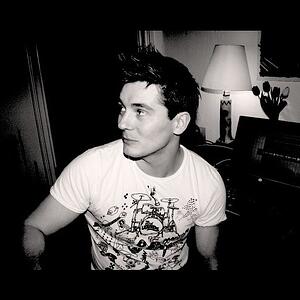 Could you tell us a little about your journey into sound design, from the early days of loving heavy metal to first discovering a passion for sound to now being an established sound designer for AAA video games?
Could you tell us a little about your journey into sound design, from the early days of loving heavy metal to first discovering a passion for sound to now being an established sound designer for AAA video games?
"The road was really bumpy. It's also very different from what I would imagine the road would be today if I was to start all over again. I'm just old enough to have started off when the internet wasn't something everybody had, YouTube and all that wasn't a thing, so finding information or being given information about positions or how to do things was very sparse.
"In hindsight the journey kicked off quite early, because I remember listening to heavy metal, but having a craving for 'something different', but I didn't have access to electronic music yet. I didn't know anyone who listened to it and everybody around me didn't like it, so my brain was saying 'this is boring' when I heard it, but my heart was drawn towards it for some reason.
"I started making electronic music at home - without having a clue about what it was or why - I just did. For many years I considered my approach sloppy and weird and I always wished that I had been more aggressive towards game audio back then, but I also know now that some of my core knowledge about sound, my creativity when working with sound and creating sounds comes from this specific period in time. Knowledge that nobody can or could teach me.
"Like most others I suffer badly from impostor syndrome and quite often feel that 'tomorrow – it will all fall apart and it's been only luck until this very day.' And for years I felt that I had wasted my time in my bedroom or even during my studies of electronic music, but once in a while there is a good and happy moment that really makes me realise that I do have certain skills, like the ones from before, that cannot be taught – they are self made.
"I remember working on one of my very first small games, with some friends, and they were looking for ambient drones and I was told it was such simple sound, yet they were difficult to create and had heard lots of stories about how impossible it was. But at that time I had just spent 3-5 years at the Conservatory of Music, basically doing only drones and noise soundscapes, and this was one of those moments that perhaps this study was actually useful to game audio, even though it was called Electronic Music Composition.
"Kind of like a "wax on, wax off" approach, Karate Kid style, I had studied and practiced one thing that I thought was useless or pointless, but in the end it gave me abilities to solve issues and be creative in so many other areas than that of it's own. I guess that was my strength.
"From there I just started spamming every company I could find. I started working on as many unpaid short films as possible, because here in Denmark there is a lot of that, which is cool. Funded short films that people can work on and everybody benefits in the end. It was simply because I knew I couldn't get game audio experience right off the bat, but I needed experience and wanted to learn, so anything sound related was for me, and to me, a step on the road to becoming a game audio sound designer."
What’s your process for sound design? Does it usually follow the same pattern or does each project demand a different approach?
"I work quite unorthodox, I found out. That sounds worse than it is, but I am quite unstructured and I work very much from a building process that I call the 'lego material', meaning that I often sit down, perhaps I have an idea or perhaps I don't and I get to work.
"Some may say that I am just fooling around until something sounds cool, but with experience that fooling around is much more direct and a faster approach than before because I know what to do to get where I want when an idea forms.
"This is usually when I design sounds. I create hundreds of tiny (or big) sounds, that I call lego material. I create a folder which I name accordingly, like "bridge lowering lego" - because I am working on a bridge being lowered perhaps, and then create all these building blocks, of wood hit, wood hard, wood squeak, version 1, 2, 3, 4, 5, 6, 7 etc. Thumb, thud, hard hit, bridge turn, bridge hit, chain roll, chain land. etc.
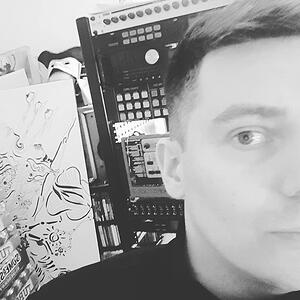 "Sometimes I run through a library of sounds and pick the ones I like, but still in the sense of "lego" and then finally I grab my entire folder and throw it into a project and start sorting there and work from there. It's easier if you see it in the making than just explaining it really.
"Sometimes I run through a library of sounds and pick the ones I like, but still in the sense of "lego" and then finally I grab my entire folder and throw it into a project and start sorting there and work from there. It's easier if you see it in the making than just explaining it really.
"Sometimes I pick a chain of effects, to add to my master and then of course I know how it responds to certain things, so I keep that in mind, but it helps me make sure that all sounds coming out right now have the same pump, the same feel, the same energy.
"I have a massive library of lego material made from hundreds of weird sounds, everything from my own custom sounds either manipulated from something or recordings or library sounds that I found and collected and chopped up, so you might not even hear the original any longer, or it's a 10 minute file from a library that I took 250ms out of because that specific bit was my 'wood hit awesome' lego brick."
You mentioned that you didn’t consider working in video games until sometime after cementing yourself as an established and successful artist in your own right. Would you say part of your success is owed to finding your creative voice before entering the video game world?
"Totally, as I said earlier I was working towards many things with sound while aiming for game audio. It can sound a little crazy, but during this journey I was a quite an established electronic music act and DJ for many years and travelled around with my laptop and gear to perform, almost all over the planet. This wasn't as much a step on the road to video games, because I did really love this, but eventually I shifted focus to games more and more. But it really helped me find my 'sound' and my way of working, and while working in video games that has been a huge benefit in many cases.
"Though I must admit I am also quite stubborn, so sometimes I need to adapt to other peoples ideas (all the time really) and in the beginning that was a little difficult, because I was used to being the creative force and not the work horse, but getting a job in a company means that both has their place and you have to accept it – also that working in game audio is sometimes anything but actually doing audio."
Did working with music or creating sounds for electronic music benefit you in any way in your journey to breaking into the video game industry?
"Making music had its ups and downs, in regards to getting into game audio - mainly because I am just not a composer, I am more of a sound designer - but during making music and electronic music I found out that I was much more interested in that 'one sound' that was cool in a track, rather than the bigger picture.
"Creating the bigger picture was nice as well, but I had an easier time and more fun creating that one cool sound. It's not necessarily a direct help that I worked with it, but it did help me out understanding a lot of things in a DAW, so like so many other things, it was beneficial in same way because it was audio related."
It took several failed applications before you were accepted on the Electronic Music Composition course, with them citing your music as being too mainstream. Do you think those following two years spent exploring and creating music outside of your comfort zone helped prepare you for the career you have now?
"It did. I always liked IDM music - which was what it took for me to get in, in the end - but I always thought of it as 'something I cannot do' or this was impossible to create, it required tools I didn't have, blah, blah, blah. Excuses.
"So when I didn't get in for the 5th, 6th, 7th time at any of the schools I applied at and especially the electronic music composition degree at the Conservatory I started focussing on, 'if it's this they want, I'll give it to them'. My thoughts were that I can always go back if it doesn't work out, but I didn't, and I've made a lot of electronic music with that angle since then and my ordinary trance/techno music became much more advanced and leaning towards IDM'ish production.
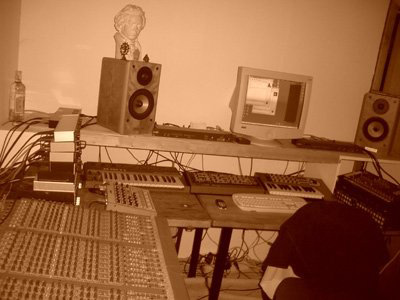
Bjørn's early setup
"I believe that me forcing myself to create something like this and feeling like a complete beginner again was really, really uncomfortable, but also so awesome because I felt I was learning again and creativity sparked from it and sounds just came out of my head again, because the techno I was doing was starting to decline in interest."
How important was it for your career development to look beyond video games, such as your work with the Danish Film Institute (DFI)?
"The DFI help a lot of projects come to life and if it wasn't for them I wouldn't have had the opportunity to work on almost 40 short films in my time as upcoming sound designer. From doing my first boom holding gig, to actually doing post for a film was immensely eye opening.
"On the road to video games, I see a lot of young talent out there who aim so hard for video games that they also deny working in other audio fields along the way. Which is actually a problem, because of the usual 'I don't have experience in games, so I cannot get a job in games' situation.
"I worked on so many other things and was always learning new stuff, but also in the long run, my résumé and portfolio grew (which it was all about really, growing that portfolio) and in the end it was big enough for even game companies to not being able to look the other way. I was very persistent, but it was very much about timing, luck, some more networking and a bit more luck to land the first gig I had (the first serious gig) and from there it was a completely different journey.
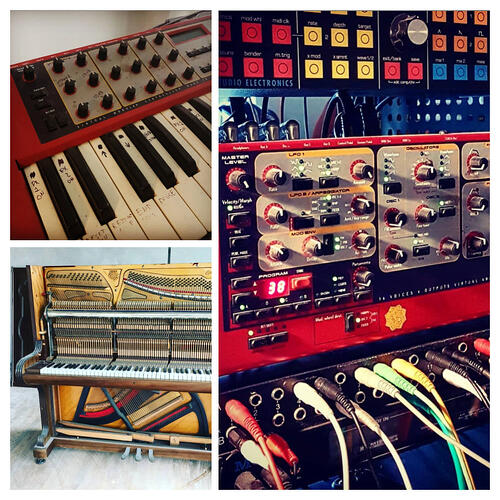 Some of Bjørn's sound design tools
Some of Bjørn's sound design tools
"When you work as a recordist and booming for TV or short films, you may learn a little about levelling and how to hold a boom pole, but the first time I was actually doing post for a short film and heard the recordings I had and others had made, that was when I realised what it actually took to make a good recording and the importance of silence and how noise in the background can ruin everything.
"This was an insanely valuable lesson for my future work and understanding of how to create the sounds I wanted, but also when working professionally with mixing and other post audio things. When it comes to that stage 90% of the ground work is already laid and as my old audio engineering teacher said, 'if it's shit, it will always be shit. You can polish it, but it will still be shit. If you can redo it without the shit – do it!'"
Though it took over a decade to get there, you finally got to work with IO Interactive on the recent Hitman reboot. Was that your “I’ve made it moment”?
"The 'I made it' moment came a little earlier, when I was an intern at CCP Games and working on EVE Online, maybe not the moment I started there, but after a few weeks there when they offered me the job extension of the internship and we started working on EVE: Valkyrie, that was some of the first work on an official VR title, then it felt like “OK, this is going in the right direction”.
"But totally, when I moved back to Denmark and got hired by IO Interactive – this was the first time where I moved on from one place to the other, realising that the first chance wasn't just luck or at least I wasn't completely lost in this game. It was very exciting. Actually, it still is every time I work on something new and fresh."
How did your creative process differ on Hitman?
My creative process differs from project to project - on Hitman in particular because of the engine and the VERY nice tools they had for controlling everything there - which totally changes the approach.
The implementation tools change how I want to design a sound, I quite often think of solutions first before I create the sound, so I know how to chop up the sound or how to implement it and it gives me a lot of ideas, rather than having an engine which only allows for one shot sounds to be played.
Sadly, your time at IO Interactive was short-lived. What happened?
IO interactive is a quite small office, in terms of the IP and its size, but a decent sized studio of employees. Hitman is a loved IP, but not the best-selling IP, and the industry's decline over the years did rough things to IO interactive and eventually they had to let 50% of us go, which they have done, almost every 2-3 years over the past 10-12 years at IO, so it wasn't very surprising really.
Job security in games isn't really a thing unfortunately. So, we were all let go – the audio department almost destroyed after that. I moved on and went to CD Projekt Red right after that.
Did it feel strange going from years of sending letters in vain to then working at IO Interactive, followed by walking into CD Projekt Red as the senior sound designer?
To some extent yes. I do sometimes feel that I am working with something that is by far beyond my understanding, yet I also realise that my résumé says otherwise now. I'm always honoured when anyone hires me or thinks of me as a source of creative sounds that they can use and hire. It still feels new and fresh when I get paid and exciting that this is where I am now, but I'm definitely not done moving on and forward.
One of the hallmarks of CD Projekt Red is the size and believability of the worlds they create, with Cyberpunk 2077 promising to be there biggest yet. Was that an intimidating thought walking into the role?
Yes and no. When you're working on a title that is so hyped, and it's just as hyped for me, but once you get settled then serious business and professionalism takes over and it becomes much more a process like anything else really. One thing that I have learned is that big projects are not necessarily that different from small projects.
What are your must-have tools?
"Me and Cubase have a very, very long term relationship. We have created so many sounds together and worked on all my music, sounds and putting so many games and films together for ages. I guess we won't really break up.
"I do look at other tools, like Reaper and so on, but I always end up going back to Cubase, I just work faster and more efficiently in it – also, Wavelab is my go-to editor. I usually do only very simple editing in it, but I also design sounds in there by using its effect chain and some weird plugins there. Which is actually a problem now that all the old 32-bit plugins are no longer supported.
"For plugins, I use the Illformed stretch, bitcrush and tape stop plugins ALL THE TIME! I am also very fond of compression, very fast and digital compressors and reverbs (you may have noticed if you have played the games I have made besides the AAAs, and the game DARQ I am doing now is like one giant low frequency compressed loveable noise soundscape – really proud of that game even before it's out.)
"I like to use Max/MSP, but I haven't touched it much in recent years. But it's still my go-to tool when my DAW or other things cannot give me what I want.
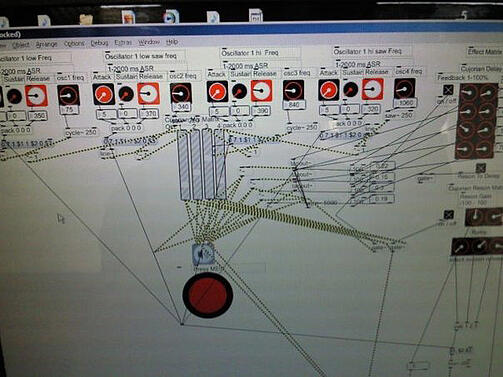
"For games I am very much a Wwise man and I really enjoy working with Wwise and it's capabilities when it comes to routing, effects and how to create sounds in there and push it's internal tools to the max."
What's been your proudest project so far and why?
"Besides DARQ – I am super proud of many of the features I put into Hitman, maybe not the most audible of things, but there is so much logic going on in Hitman that I put together and created templates for others to use (they made templates for me as well) and I really think Hitman was a massive game to work on and really fuelling creativity with its engine and Wwise."
Any advice for our students looking to pursue a career in composition?
"Keep pushing, work on anything sound related you can find, be curious, try to also let it go and do something completely non-sound once in a while, that can take your mind off it. Like, I play golf now and then, and that takes all the stress out of me, which is weird, because as you play golf you hate the game and you are super stressed about it, but I guess it's a stress diverter from other kinds of stress.
"Above all else, please understand that working in audio and games is hard and serious work and there will be lots of “why do I have to do this” moments. Learn scripting, visual scripting and other logic tools – wax on wax off, you never know when you might need it."
Where can people find out more about you and your music?
I have several pages of things, but the best place to start would be https://www.cujo.dk/ which is my own website and my Patreon where I post all my tutorials, videos and links. It's free, but you can most definitely support me and the page if you feel like it.
The very LAST recording from a Cujorius One live performance in Tel Aviv, 2012.
FIND OUT MORE
https://www.cujo.dk/
Patreon
YouTube
Soundcloud
LinkedIn


